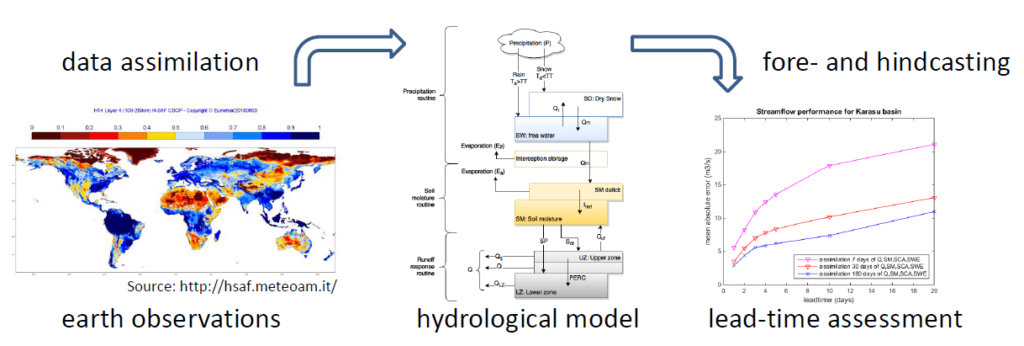Break-out session “Assimilate your basin”
Side-event at the HEPEX Workshop in Quebec on Thursday, June 9, 2016
Session organizers:
- Dirk Schwanenberg (Deltares, University of Duisburg-Essen)
- Albrecht Weerts (Deltares, Wageningen University)
- Rodolfo Alvarado Montero (University of Duisburg-Essen)
- Peter Krahe (German Federal Institute of Hydrology)
Session outline:
The dynamic development of remote sensing products offers great opportunities in operational hydrology. The assimilation of these products into hydrological forecasting models enables the estimation of better system’s states at forecast time and related uncertainties. This is expected to increase the model’s forecasting skills.
The main objective of this session is to introduce the participants to open-source and freely available tools for the setup of lumped, semi-distributed and distributed HBV-style hydrological models (WFLOW, RTC-Tools HBV-D12), the semi-automated model calibration, the implementation of data assimilation techniques by Kalman Filters (OpenDA) and variational approaches (RTC-Tools), as well as the integration of these tools into an operational forecasting platform (Delft-FEWS).
Hindcasting experiments with the assessment of lead time performance will address the added value of various remote sensing products and data assimilation techniques on the forecasting skill of the models we will jointly setup for each participant’s basins during the break-out session.
- Operational setup of your basin in a forecasting system including model calibration scripts, several data assimilation techniques and hindcasting experiments;
- Contribution to a joint scientific paper.
Registration: (closed)
Send an email to dirk.schwanenberg@deltares.nl to register until May 25th, 2016. The maximum number of participants is 15 people. Instructions on the preparation of required data of your basin will be sent prior to the session.
Organization and contact:
- Date / Time: Thursday, June 9, 9:00 – 13:00
- Location: Université Laval, Quebec (Room 2810, Building: Pavillon Alexandre-Vachon). Follow this link to locate the building inside the Campus.
- Required equipment: Notebook with Windows OS, Python 2.7, XML Spy (check for the 30-days trial), SVN Tortoise
- Contact: Dirk Schwanenberg
